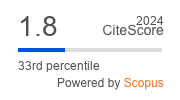Perbandingan Metode Klasifikasi Analisis Sentimen Tokoh Politik Pada Komentar Media Berita Online
Abstract
General elections are an important part of the political process so that many political figures participate in the process. Electability is one of the concerns, various things are done to be able to increase the electability of political figures who participate in general elections. Media has become one of the important tools used to increase electability, one of which is online news media. Reader comments can be used as an assessment of political figures in the form of sentiment analysis. However, it is not easy to analyze sentiments from comments on online news media, because comments contain unstructured text, especially in Indonesian text. Text pre-processing in text mining is an important part of getting the basic information contained in the comments. This research uses Indonesian text pre-processing using the Gata Framework Tetmining. Then proceed with extracting information using the Naïve Bayes classification algorithm and Support Vector Machine which are optimized using Particle Swarm Optimization. Tests carried out with both methods get the results that, Particle Swarm Optimization based on Support Vector Machine is the best method with an accuracy of 78.40% and AUC 0.850. This study found an algorithm that was effective in classifying positive and negative comments related to political figures from online news media.
Downloads
References
[2] Taibbi, M., 2019. In 2019, Let’s Finally Retire ‘Electability’ A favored totem of the campaign press has long been useless, and now is actively misleading [Online] (Updated 2 Jan 2019). Tersedia di: https://www.rollingstone.com/politics/politics-features/what-is-electability-774196/
[3] Jannti, R., Mahendra, R., Wardhana., W, C. Adriani, M, 2018. Stance Classification Towards Political Figures on Blog Writing. In: IEEE, 2018 International Conference on Asian Language Processing (IALP). Bandung, Indonesia 15-17 November 2018. Indonesia.
[4] Oxford Disctionaries, 2018. Sentiment Analysis. [Online]. Tersedia di: https://en.oxforddictionaries.com/definition/sentiment_analysis/
[5] Liu, B., 2015. Sentiment Analysis Opinions, Sentiment, and Emotion in Text. Chicago, USA: Cambridge University Press.
[6] Saputra, N., Adji, T. B., Permanasari, A. E, 2015. Analisis Sentimen Data Presiden Jokowi dengan Preprocessing Normalisasi dan Stemming menggunakan Metode Naive Bayes dan SVM. Jurnal Dinamika Informatika, 5(1).
[7] Li, Quanzhi., Nourbakhsh, A. Fang, Rui. Liu, Xiaomo. Shah, Sameena, 2016. Sentiment Analysis of Political Figures across News and Social Media. In: Behavioral-Cultural Modeling, & Prediction and Behavior Representation in Modeling and Simulation, 2016 International Conference on Social Computing. UDC Center, Washington DC, USA.
[8] Budiharto W., Meiliana M., 2018. Prediction and analysis of Indonesia Presidential Election from Twitter using Sentiment Analysis. Journal of Big Data 5(1), pp.1-10.
[9] Aliandu, Paulina, 2013. Twitter Used by Indonesian President: An Sentiment Analysis of Timeline. 2013 Information Systems International Conference (ISICO). Surabaya, Indonesia 2-4 December 2013. Indonesia.
[10] Apriyanti, T., Wulandari, H., Safitri, M., & Dewi, N., 2016. Translating Theory of English into Indonesian and Vice-Versa. Indonesian Journal of English Language Studies 2(1), pp. 38-59.
[11] R. Feldman and J. Sanger, 2007. The Text Mining Handbook: Advances Approaches in Analyzing Unstructured Data. New York, NY: Cambridge University Press.
[12] Goyal, Shubham, 2016. Sentimental Analysis of Twitter Data using Text Mining and Hybrid Classification Approach. International Journal of Advance Research, Ideas and Innovations in Technology 2(5), pp.1-9.
[13] Vadivukarassi, M., Puviarasan, N., Aruna, P., 2017. Sentimental Analysis of Tweets Using Naive Bayes Algorithm. World Applied Sciences Journal 35(1), pp.54-59.
[14] Al-Amrani, Y., Lazaar, M., El Kadiri, E.K., 2018. Sentiment Analysis Using Hybrid Method of Support Vector Machine And Decision Tree. Journal of Theoretical and Applied Information Technology 96(7), pp.1886-1895.
[15] Wahyudi, M., Kristiyanti, D.A., 2016. Sentiment Analysis of Smartphone Product Review Using Support Vector Machine Algorithm-Based Particle Swarm Optimization. Journal of Theoretical and Applied Information Technology 91(1), pp.189-201.
[16] Buntoro, G. A., 2016. Analisis Sentimen Calon Gubernur DKI Jakarta 2017 Di Twitter. Integer Journal Maret 1(1), pp. 32-41.
[17] Budiono, D. F., Nugroho, A. S., Doewes, A., 2017. Twitter Sentiment Analysis of DKI Jakarta’s Gubernatorial Election 2017 with Predictive and Descriptive Approaches. In: IEEE, 2017 International Conference on Computer, Control, Informatics and Its Applications. Jakarta, Indonesia 23-26 October 2017. Indonesia.
[18] Fatyanosa, T. N., & Bachtiar, F. A., 2017. Classification method comparison on Indonesian social media sentiment analysis. In: IEEE, 2017 International Conference on Sustainable Information Engineering and Technology (SIET). Malang, Indonesia 24-25 November 2017. Indonesia.
[19] Rana, S., Singh, A., 2016. Comparative Analysis of Sentiment Orientation Using SVM and Naïve Bayes Techniques. In: IEEE, International Conference on Next Generation Computing Technologies. Dehradun, India 14-16 October 2016. India.
[20] Kenneth Jensen, 2016. IBM SPSS Modeler CRISP-DM Guide. [Online]. Tersedia di: ftp://public.dhe.ibm.com/software/analytics/spss/documentation/modeler/18.0/en/ModelerCRISPDM.pdf
Copyright (c) 2019 Jurnal RESTI (Rekayasa Sistem dan Teknologi Informasi)

This work is licensed under a Creative Commons Attribution 4.0 International License.
Copyright in each article belongs to the author
- The author acknowledges that the RESTI Journal (System Engineering and Information Technology) is the first publisher to publish with a license Creative Commons Attribution 4.0 International License.
- Authors can enter writing separately, arrange the non-exclusive distribution of manuscripts that have been published in this journal into other versions (eg sent to the author's institutional repository, publication in a book, etc.), by acknowledging that the manuscript has been published for the first time in the RESTI (Rekayasa Sistem dan Teknologi Informasi) journal ;








